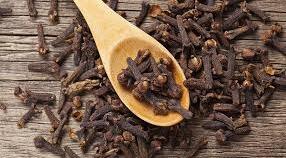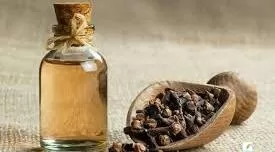Cloves were once considered one of the most valuable of all spices, and their value was measured in gold. The dried blossoms of the clove tree are what we know as cloves. Cloves are thought to have originated in the Spice Islands, which are located near China. During the late Middle Ages, cloves made their way to Europe and Asia, where they were an integral element of the cuisine of those regions. Cloves continue to be an important spice that may be used to give a variety of meals an extra kick.
As a result of their wide range of painkilling properties, they are also commonly used in Ayurvedic and traditional Chinese medicine. However, the advantages do not stop there. The antioxidant-rich spice packs a powerful punch in the field of nutrition and helps the body in many different ways, including maintaining healthy blood sugar levels, reducing inflammation, and relieving stomach discomfort.

Cloves are often used in Indian kitchens to add more flavor to food. In addition to making the meal taste more appetizing, it is also a spice that has medicinal properties and works wonders for the body. Cloves, which have the scientific name Syzygium aromaticum, are thought to be good for your health in many ways, especially according to the principles of Ayurveda. If you eat clove every day, it can help ease pain in your stomach, teeth, and throat because it has healing properties. Clove can also be used to treat toothaches.
The Goodness of cloves benefits
The clove, which has a tiny appearance and a taste that is described as being slightly bitter, is abundant in numerous aspects. Cloves contain a compound known as eugenol, which is responsible for their ability to combat a wide range of health issues, including stress, gastrointestinal conditions, Parkinson’s disease, and body aches. In addition to having anti-inflammatory and anti-bacterial effects, cloves also include important nutrients such as vitamins E and C, folate, riboflavin, vitamin A, vitamin D, and omega-3 fatty acids. Cloves also contain thiamine.
In this essay, the amazing benefits of cloves in their numerous forms are dissected, and a shocking fact that most of us are unaware of is revealed. Moreover, potential adverse effects and safety precautions linked with cloves are covered here.
Nutritional Value of Cloves Cloves not only smell great and add flavor to foods like biryani, dal, curries, soups, and tea, but they are also very healthy. They include a lot of important vitamins, minerals, and dietary fiber. In addition to providing a sufficient quantity of fiber to aid in digestion and the maintenance of a healthy weight, their naturally low-calorie content makes them an excellent choice for dieters. Along with calcium and phosphorus, cloves are a great source of the essential trace mineral manganese. Manganese is important for keeping your brain and bones healthy.
Richness of Clove
Cloves have a lot of vitamin K, which helps blood clot quickly when there is damage to tissue. Also, cloves have a lot of potassium, which makes them an important part of keeping blood pressure normal and preventing high blood pressure. Moreover, cloves have a myriad of components with powerful antioxidant qualities.
Some of these compounds include vitamin C, vitamin E, eugenol, flavonoids, and gallic acid. These compounds work to rid the body of damaging free radicals. Because of this, the risk of cancer is reduced, the immune system is strengthened, the metabolism is optimized, and the skin and hair become healthier.
Methods for Incorporating Cloves Into Your Everyday Diet Cloves have been an inseparable component of Indian cuisine for as long as anyone can remember. In addition to being good for your health, they have a strong minty smell and a slightly spicy taste that makes them perfect for cooking. In India, cloves are referred to as “laung” or “lavanga,” and they are utilized in traditional desi cooking either as the whole bud or as a powder made from ground-up cloves.
Clove powder is frequently included in traditional Indian spice blends, including garam masala, goda masala, and chettinad masala, amongst others. Teas, warm beverages, and sweets can also benefit from the addition of clove powder or dried buds because it enhances the flavor of sweeteners like sugar, honey, and jaggery.
In order to give dishes like pulao and biryani, as well as dals, meat curries, and soups, an exhilarating smell and a flavor that is only slightly sour, clove is added in very small amounts.

Clove’s Nutritional Value
| Nutrient | Value per 100 g |
| Carbohydrate | 61.21 g |
| Protein | 5.98 g |
| Fat | 20.07 g |
| Energy | 323 kcal |
| Fibre | 34.2 g |
| Calcium | 646 mg |
| Iron | 8.68 mg |
| Potassium | 1102 mg |
| Phosphorus | 105 mg |
| Magnesium | 264 mg |
| Sodium | 243 mg |
| Copper | 0.347 mg |
| Zinc | 1.09 mg |
| Selenium | 5.9 mcg |
| Manganese | 30.033 mg |
| Vitamin C | 80.8 mg |
| Riboflavin | 0.267 mg |
| Thiamine | 0.115 mg |
| Vitamin B6 | 0.590 mg |
| Niacin | 1.458 mg |
| Vitamin A | 530 IU |
| Vitamin E | 8.52 mg |
| Vitamin K | 141.8 mcg |
| Fatty acids, total saturated | 5.438 g |
| Fatty acids, total monounsaturated | 1.471 g |
| Fatty acids, total polyunsaturated | 7.088 g |
Possible Applications of Clove:
The possible applications of clove are described in the following sentence.
Clove aids in eradicating germs and fungi.
Several types of fungi and bacteria were used to test clove’s antifungal and antibacterial properties. In the laboratory, clove proved to be highly effective at eliminating all types of food-borne germs, including E. coli, Bacillus cereus, and Staphylococcus aureus.
It has been demonstrated that clove oil is effective against Staphylococcus species. The fungus Aspergillus niger was extremely susceptible to the effects of clove oil. In addition, a laboratory study found that clove oil has a germicidal impact against Klebsiella pneumoniae, Pseudomonas aeruginosa, Clostridium perfringens, E. coli, S. aureus, and Candida albicans. Also, it was found to be very good at killing the Bacillus tuberculosis bacteria.
Laboratory research has shown evidence of the substance’s antibacterial capabilities. Before clove can be recommended as a treatment for infectious diseases in people, more research needs to be done on it. Because of this, you shouldn’t use clove oil until you’ve talked to your regular doctor about it.

Protects the liver and guards it against potential threats.
An extract of clove was evaluated for its potential to protect liver function in an animal model. Aspartate aminotransferase, alanine transaminase, and alkaline phosphatase were all able to work again after the clove extract was added to the serum. This showed that it was good for the liver. But if you have a liver condition, you should talk to your doctor before using clove as a treatment.
Clove oil (eugenol) may assist in clearing the respiratory passages and function as an expectorant in the management of numerous upper-respiratory disorders such as bronchitis, cough, cold, asthma, and sinus conditions. This may be one of the potential uses for clove when it comes to inflammation.
Clove contains flavonoids like caryophyllene, kaempferol, and rhamnetin. It is thought that these flavonoids are what give clove its antioxidant and anti-inflammatory effects. Before using cloves or clove oil to treat any inflammatory problem, you need to discuss the matter with your primary care physician.
In clinical tests, clove and eugenol both showed potent antioxidant effects. This opens the door to the possibility of using clove as an antioxidant. Clove can reduce lipid peroxidation and make hydrogen at the same time, which is a very useful property.
In a database kept by the US Department of Agriculture, universities, and private companies, it is stated that clove has more polyphenols and other antioxidant chemicals than other spices. An extract from clove buds has the potential for use as an antioxidant in food.
Clove use has been shown to benefit a number of bodily functions, including those of the kidneys, liver, and antioxidant status, according to a few studies. In order to receive an accurate diagnosis before beginning treatment with cloves or any other herb for its purported health advantages, you must first consult with a qualified medical professional.
Act as a painkiller.
Since the 13th century, anecdotal evidence has demonstrated that clove has a pain-killing effect. Clove oil has shown promise as a possible treatment for a number of painful conditions, such as spasms, tooth pain, and joint pain. Because it can alleviate toothache, clove oil has been utilized extensively as an analgesic (painkiller) agent in dental clinics in recent years.
It is possible that this will reduce inflammatory mediators, such as leukotriene and prostaglandin. Also, it is believed that it inhibits the sensory receptors that are responsible for transmitting pain signals. You should only use clove if a qualified medical professional tells you to or after you talk to a medical professional.
Helps cure disorders connected to the stomach.
Clove oil can be used to relieve bloating and gas symptoms. There is also some evidence that clove oil can help treat stomach problems like motion sickness, nausea, hiccups, and vomiting.
If you are experiencing any stomach issues, you need to make an appointment with your primary care physician so that they can make a diagnosis. Before you start using herbal or homeopathic treatments, you should talk to your primary care provider about them.
Clove treats disorders related to the brain.
People say that clove oil can improve circulation, which can help with sleeplessness, anxiety, memory loss, depression, tiredness, and mental weariness. Clove oil is extracted from the clove fruit.
In an animal model of depression, clove oil was found to be effective in treating the symptoms. It was found to be helpful because it had the same effect as an antidepressant. Nonetheless, clove oil should not be used in place of seeking professional medical attention. Always talk to your primary care physician or see a psychiatrist if you are experiencing any kind of emotional or mental anguish.
Clove helps to combat cancer.
Clove may be able to fight cancer because it has antioxidant properties. Because of this, it may be able to be used to treat cancer. It was found to be effective against skin, lung, and digestive tract cancers. It’s possible that oleanolic acid is what makes it work against tumors.
It has also been shown to kill cancer cells of the colorectal, breast, and leukemia types. Human trials on a large scale are needed for there to be enough evidence to support the use of cloves to treat cancer in people. Because of this, it is highly recommended that you follow the cancer treatment and advice your oncologist gives you.
What is the Most Effective Way to Use Clove?
Clove can be utilized as:
Either as a powder or an oil
Many dental products, such as toothpaste, dental creams, throat sprays, and mouthwashes, all contain these ingredients in one form or another.
Before using cloves or any other herbal supplement, you need to get the okay from a licensed medical professional. In the same way, you shouldn’t switch from modern medicine to ayurvedic or herbal medicine without first talking to a licensed medical professional.
Here is a list of side effects that have been linked to clove use.
Clove-flavored cigarettes can cause a number of health problems, such as hemorrhagic pulmonary edema, bronchitis, pneumonia, occupational allergic contact dermatitis, and central nervous system depression.
Even when used in very small amounts, clove oil can cause problems like contact dermatitis, irritation in the area where it is used, and very rare allergic reactions.
Consuming or being exposed to a significant quantity can cause injury to the tissues, as well as a syndrome characterized by an abrupt onset of seizures and damage to the liver and kidneys, as well as coma.
Before taking cloves or any other herb for its supposed health benefits, you should talk to your doctor or another medical professional about any risks that may be involved. Even if it is supposed to be good for your health, you should talk to your doctor or nurse about any risks that may come with it. You won’t have to deal with any unpleasant side effects as a result.
When working with cloves, exercise extreme caution. The following is a list of some general precautions that should be exercised when working with cloves.
For children, it is not advisable because clove oil has a chemical called cytotoxin (a substance that kills cells) which causes serious acute kidney or liver harm at higher dosages. Clove oil is also a carcinogen (a substance that causes cancer). Because of this, parents should use caution before providing cloves to their children.
There is an insufficient amount of information on its use during nursing or pregnancy. So, you should talk to your primary care doctor before you drink cloves or anything else that has cloves in it.
Also, before you use clove for any of its health benefits, you should talk to your doctor or nurse about any risks, precautions, or limits that might come with using clove. It will assist you in making choices that are based on accurate information.
Clove may increase the risk of bleeding or make warfarin work better because it may interact with other medicines.
If you are taking medicines for any kind of illness, you should talk to your doctor about any possible interactions between those medicines and any other herbs or drugs you might be taking. If you are taking medicines for any kind of illness, you should talk to your doctor about any possible interactions between those medicines and any other herbs or drugs you might be taking. It will assist you in avoiding unwelcome drug interactions with herbs.

Some FAQ’s
1) Is cloves a healthy food for kids to eat?
When given in the right amount or dose, it is safe for children to eat. If kids eat a lot of clove oil, it can hurt their kidneys or livers in a short amount of time. Clove oil is a cytotoxin. Because of this, parents should use caution before providing cloves to their children. Under no circumstances should cloves be used to treat any kind of illness in a child unless specifically instructed to do so by a medical professional.
2) Is clove an effective remedy for a toothache?
Clove oil is often used as a painkiller in dental clinics because it can help with toothaches. This is the case.
3) Does clove have any positive health effects?
Due to the fact that clove has antioxidant and anti-inflammatory characteristics, it may be beneficial to one’s health. It could be used to treat stomach problems like diarrhea, flatulence, nausea, indigestion, vomiting, gastric irritation, and loose stools. It could also be used to treat respiratory problems like colds, coughs, bronchitis, sinusitis, asthma, and many more.
Nonetheless, the appropriate quantity should be taken in when consuming it. It is also possible for an overdose to create adverse effects. Some of the things that could go wrong with this drug are rare allergic reactions, local irritation, pneumonia, hemorrhagic pulmonary edema, occupational allergic contact dermatitis, bronchitis, and depression of the central nervous system.
Because of this, clove should only be used after first discussing its use with a trained medical professional. However, if you are having tooth pain or other dental concerns, you should make an appointment with your dentist as soon as possible for an examination. If you use herbal treatments without first contacting your dentist, you could make the issue worse.
4) What are some uses for clove?
Clove can be used in powdered or oil-based forms.
Before using cloves for anything that has to do with your health, you should talk to a doctor. He will tell you how much and what kind of plant you should eat based on the details of your condition.
5) Can cloves help with bloating in any way?
Sure, that could assist with the bloat. Clove oil has been shown to be a useful cure for the management of bloating and gas, and it also helps to relieve the gas pressure that is present in the stomach. Before using it, one ought to consult with a qualified medical professional.
6) Does clove provide any benefits for the lungs?
Yeah, there is some evidence that clove may be beneficial to the lungs. People with bronchitis, sinusitis, asthma and other lung problems might feel better after inhaling its oil. Moreover, it might help clear the nasal passages. But lung problems can be very serious, so you should see a doctor to get an accurate diagnosis and treatment.
7) Is it okay for youngsters to eat clove?
When given in the right amount or dose, it is safe for children to eat. If kids eat a lot of clove oil, it can hurt their kidneys or livers in a short amount of time. Clove oil is a cytotoxin. Because of this, parents should use caution before providing cloves to their children. Under no circumstances should cloves be used to treat any kind of illness in a child unless specifically instructed to do so by a medical professional.
Disclaimer: The author’s views are his or her own. The facts and opinions in the article have been taken from various articles and political commentaries available in the online media and Eastside Writers does not take any responsibility or obligation for them.
Note: Contact our Writers at www.eastsidewriters.com for writing Blogs/Articles on any niche. We have experts in various domains from Technology to Finance and from Spirituality to Lifestyle and Entertainment.







Pingback: Learn Cooking Sumptuous And Mouth Licking Biriyani The Easiest Way